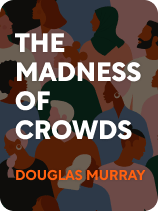

This article is an excerpt from the Shortform book guide to "The Madness of Crowds" by Douglas Murray. Shortform has the world's best summaries and analyses of books you should be reading.
Like this article? Sign up for a free trial here.
What’s cancel culture? Who’s behind it? Are conservative voices silenced more than others?
Douglas Murray believes that one of the most destructive effects of wokeism is the suppression of free speech through cancel culture. In his book The Madness of Crowds, he explains why conservatives in particular are often the target of this suppression.
Read more to learn Murray’s take on the censorship of conservatives in today’s society.
Censorship of Conservatives
Murray argues that the New Ideology is harming free speech by trying to force consensus where it doesn’t exist and punishing those who don’t conform (especially through the censorship of conservatives). Its adherents decide certain viewpoints on issues such as trans rights and racism are objectively correct, and they demonize alternative opinions. Anyone who dares to offer a contrary opinion risks being subject to “cancel culture”: public ridicule and the possible collapse of their reputation, career, and livelihood. Cancel culture harms free speech and prevents discussion around significant issues that deserve open debate.
(Shortform note: Other authors believe that our inability to consider opposing viewpoints doesn’t come from either the left’s ideology or identity politics but from partisan politics as a whole. In Why We’re Polarized, Ezra Klein argues that the two major US political parties divide American citizens into what he calls two super-identities, whose major concern is simply beating the other side in a winner-takes-all fashion. This division then aggravates sentiments around issues like race, sexuality, and religion because our views on these topics tend to correspond with the positions of the party we feel loyal to. Partisan voters feel increasingly hostile toward one another and reward politicians who deliberately antagonize the other side, driving further rounds of polarization.)
| Do Canceled Individuals Feel Canceled? Not everyone who’s publicly criticized the positions of the New Ideology feels that cancel culture has ruined their careers or reputations. For example, Harry Potter author J.K. Rowling came under intense criticism in 2020 for challenging the idea that transgender women could ever truly share the experiences of cisgender women. Despite the backlash she received—for instance, accusations of transphobia—Rowling asserts that she has never considered herself canceled. Instead, she claims that her book sales actually increased when she publicly referenced the backlash. |
Murray argues that the New Ideology’s tendency toward censorship makes it difficult for people with conservative views to voice their opinions on hot-button issues like race, homosexuality, and transgenderism for fear of provoking public outrage. Public attitudes have rapidly become more favorable toward topics like women’s empowerment and LGBTQ+ rights, which has left many social conservatives feeling left behind and like their values are threatened. However, due to cancel culture, conservatives no longer feel able to voice this feeling.
| Awareness of Cancel Culture in the US To what extent does cancel culture leave conservatives fearful of expressing their opinions? The fear may be less prevalent than Murray suggests. Some statistics show that many Americans aren’t fully aware of cancel culture’s existence, let alone its potential impact on their lives. For example, in 2020, the majority of Americans (56%) reported either not knowing what cancel culture was or hearing about it infrequently, with little statistical difference across party lines. Instead, the largest difference in cancel culture awareness was across generations. Sixty-four % of young adults under 30 reported they’d heard either a reasonable amount or a significant amount about it, compared with only 34% above age 50. Aside from cancel culture, there may be other reasons why people—conservatives or otherwise—are reluctant to speak on political issues. One is the increase in general stress they experience when discussing politics with people of opposite views. For instance, around 60% of staunch American Democrats and Republicans reported such conversations as either frustrating, stressful, or both. However, moderates on each side frequently reported less agitation. |

———End of Preview———
Like what you just read? Read the rest of the world's best book summary and analysis of Douglas Murray's "The Madness of Crowds" at Shortform.
Here's what you'll find in our full The Madness of Crowds summary:
- That Western society is consumed by social justice and identity politics
- Why we must combat this ideology and restore opportunities for disagreement
- How conservative viewpoints are being silenced and possible remedies






